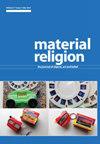Indigenous Movement, Settler Colonialism: A History of Tlicho Dene Continuity through Travel
IF 0.4
3区 哲学
0 RELIGION
引用次数: 4
Abstract
Abstract Since time immemorial, Indigenous Dene Peoples have traveled ancestral routes throughout what is currently northern Canada and interior Alaska. Tłįchǫ Dene have continued to cultivate an identity as travelers throughout a history of ecological change and the settler ideology of Canadian colonialism. In this article, I aim to contribute to scholarship on Tłįchǫ travel and history by focusing on an additional dimension of movement: materiality. I have previously written about Tłįchǫ ecological ontologies relating to Indigenous conceptions of personhood in a more-than-human-world. In this article I apply my understanding of Tłįchǫ ontologies to the material dimensions of movement on the land, past and present, revealing an ontological, ecological, and spiritual continuity despite—although adapted in response to—settler-colonialism and climate change.土著运动,定居者殖民主义:通过旅行的特里科-迪尼连续性的历史
摘要自古以来,土著Dene人就沿着祖先的路线穿越目前的加拿大北部和阿拉斯加内陆。在生态变化的历史和加拿大殖民主义的定居者意识形态中,Tłįcho Dene一直在培养旅行者的身份。在这篇文章中,我的目标是通过关注运动的另一个维度:物质性,为关于TłĮcho \808旅行和历史的学术做出贡献。我之前曾写过关于TłĮcho \808生态本体论的文章,这些本体论与一个超越人类的世界中土著人的人格概念有关。在这篇文章中,我将我对TłĮcho \808本体论的理解应用于过去和现在土地上运动的物质维度,揭示了本体论、生态和精神的连续性,尽管这是对定居者殖民主义和气候变化的回应。
本文章由计算机程序翻译,如有差异,请以英文原文为准。
求助全文
约1分钟内获得全文
求助全文

 求助内容:
求助内容: 应助结果提醒方式:
应助结果提醒方式:


